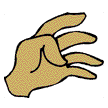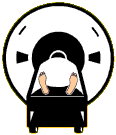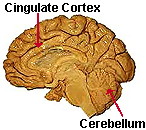By Ellen Kuwana
Neuroscience for Kids Staff Writer
December 5, 2000
"I'm Going to Tickle You!"  When someone threatens
to tickle you and then comes toward you with fingers extended,
chances are you will burst out laughing, even if you haven't been tickled
yet. Martin Ingvar and his team of researchers at the Karolinska
Institute in Stockholm, Sweden, wanted to find out what your brain is
doing when this happens. Using a brain scan called functional magnetic
resonance imaging (fMRI), they compared brain images of what happens
during an actual tickle with those of an anticipated tickle. When someone threatens
to tickle you and then comes toward you with fingers extended,
chances are you will burst out laughing, even if you haven't been tickled
yet. Martin Ingvar and his team of researchers at the Karolinska
Institute in Stockholm, Sweden, wanted to find out what your brain is
doing when this happens. Using a brain scan called functional magnetic
resonance imaging (fMRI), they compared brain images of what happens
during an actual tickle with those of an anticipated tickle.
 They found that an anticipated tickle activated the same areas
of the brain as a real tickle. The main areas that "lit up" were the
primary somatosensory cortex and secondary somatosensory
cortex indicating that the brain appears to be able to predict
what the sensation is going to be. Why might this be a good thing?
Visualizing possible outcomes might speed up response time to
potentially dangerous stimuli such as rapidly approaching objects and may
be important for avoiding or catching objects. They found that an anticipated tickle activated the same areas
of the brain as a real tickle. The main areas that "lit up" were the
primary somatosensory cortex and secondary somatosensory
cortex indicating that the brain appears to be able to predict
what the sensation is going to be. Why might this be a good thing?
Visualizing possible outcomes might speed up response time to
potentially dangerous stimuli such as rapidly approaching objects and may
be important for avoiding or catching objects.
Another Ticklish Question Have you wondered why you can't tickle
yourself? This is the question that Sarah-Jayne Blakemore, Daniel Wolpert
and Chris Frith researched at the Institute of Neurology, University
College London in England. They used fMRI to peer into the brains of
subjects while the people were tickling themselves or having their palms
tickled by someone else.
 Their results suggest that you can't tickle yourself because
your brain predicts the tickle from information it already has about, say,
your fingers moving. Certain areas of the brain including the
secondary somatosensory cortex and the anterior
cingulate cortex are less active when you tickle yourself. The
people in the study also reported that they were much more "ticklish" when
another person tickled them than when they tickled themselves. Another
part of the brain, the cerebellum, also responded
differently depending on where the touch originated (from self or from
another person). The cerebellum controls balance and coordination, so it
might be involved in predicting what effect movement of one part of the
body has on other body parts. Their results suggest that you can't tickle yourself because
your brain predicts the tickle from information it already has about, say,
your fingers moving. Certain areas of the brain including the
secondary somatosensory cortex and the anterior
cingulate cortex are less active when you tickle yourself. The
people in the study also reported that they were much more "ticklish" when
another person tickled them than when they tickled themselves. Another
part of the brain, the cerebellum, also responded
differently depending on where the touch originated (from self or from
another person). The cerebellum controls balance and coordination, so it
might be involved in predicting what effect movement of one part of the
body has on other body parts.
Why Is This Research Important?
Anytime scientists learn something about how the brain works normally, it
sheds light on what might be happening when something goes wrong with the
brain. In this case, information about how the brain distinguishes
self-generated touch from touch generated externally could help unravel
one of the mysteries of schizophrenia.
Schizophrenics often have trouble distinguishing external events from
self-generated ones. As Dr. Firth, a co-worker of Dr. Blakemore, explains
it, there is a problem with self-monitoring. He gives an example
of a person with schizophrenia:
"My fingers pick
up the pen, but I don't control them. What they do has nothing to do with
me."
People with schizophrenia often believe
that they are being touched, even when no one is actually touching them.
Some people with schizophrenia "hear voices" (auditory hallucinations)
when in fact there is no one around.
 To support this theory of a defect in self-monitoring in
schizophrenics, Frith and colleagues compared patients who had symptoms of
schizophrenia with patients who did not. The patients with no symptoms
reported that they were much more "ticklish" when another person tickled
them as compared with when they tickled themselves (this is consistent
with reports from the study above). Those who had experienced auditory
hallucinations and other symptoms of schizophrenia reported no difference in how ticklish they were -- they
experienced the same degree of tickishness whether another person tickled
them or when they tickled themselves! To support this theory of a defect in self-monitoring in
schizophrenics, Frith and colleagues compared patients who had symptoms of
schizophrenia with patients who did not. The patients with no symptoms
reported that they were much more "ticklish" when another person tickled
them as compared with when they tickled themselves (this is consistent
with reports from the study above). Those who had experienced auditory
hallucinations and other symptoms of schizophrenia reported no difference in how ticklish they were -- they
experienced the same degree of tickishness whether another person tickled
them or when they tickled themselves!
References: - Rostler, S., Tickling Your Fancy: How the Brain
Responds to Touch, on-line at www.brain.com, September, 12, 2000.
- Netting, J., Brain: Tickling Your Fancy, Nature, August 30,
2000.
- Blakemore, S-J., Wolpert, D. and Frith, C., Why Can't You Tickle
Yourself?, NeuroReport, 11:R11-16, 2000.
- Carlsson, K., Petrovic, P., Skar, S., Petersson, K.M. and Ingvar, M.,
Tickling Expectations: Neural Processing in Anticipation of a Sensory
Stimulus, Journal of Cognitive Neuroscience, 12:691-703, 2000.
|




 When someone threatens
to tickle you and then comes toward you with fingers extended,
chances are you will burst out laughing, even if you haven't been tickled
yet. Martin Ingvar and his team of researchers at the Karolinska
Institute in Stockholm, Sweden, wanted to find out what your brain is
doing when this happens. Using a brain scan called functional magnetic
resonance imaging (fMRI), they compared brain images of what happens
during an actual tickle with those of an anticipated tickle.
When someone threatens
to tickle you and then comes toward you with fingers extended,
chances are you will burst out laughing, even if you haven't been tickled
yet. Martin Ingvar and his team of researchers at the Karolinska
Institute in Stockholm, Sweden, wanted to find out what your brain is
doing when this happens. Using a brain scan called functional magnetic
resonance imaging (fMRI), they compared brain images of what happens
during an actual tickle with those of an anticipated tickle. ![[email]](./gif/menue.gif)
![[survey]](./gif/menusur.gif)
![[newsletter]](./gif/menunew.gif)
![[search]](./gif/menusea.gif)